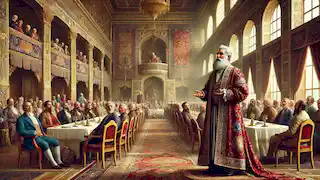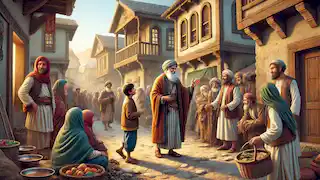Once upon a time, in a small village nestled at the foot of the Alborz Mountains in Iran, there lived a wise old man named Darian. Darian was known throughout the village for his vast knowledge, gentle nature, and the wisdom he had acquired through the years. His face was lined with the marks of time, his eyes sparkled with kindness, and his long, white beard flowed like a river of wisdom. Darian had spent most of his life helping others, sharing his knowledge, and guiding the villagers through difficult times. He was loved and respected by all.
In the same village lived a rich man named Bahram. Bahram was the wealthiest man in the region, but he was known far and wide not for his riches, but for his cold heart and unkind demeanor. He owned vast lands, numerous flocks of sheep, and a grand mansion that towered over the modest homes of the villagers. Despite his wealth, Bahram was never content. He always wanted more—more land, more money, more power. His greed knew no bounds, and he treated those around him with disdain. The villagers feared Bahram, for they knew he was capable of great cruelty.
One day, as the first signs of winter began to settle over the village, Bahram decided to throw a grand feast. He wanted to display his wealth and power to the neighboring towns and show them that he was the most powerful man in the region. He ordered his servants to prepare the finest dishes, bring in musicians from the city, and decorate his mansion with the most luxurious tapestries. The villagers, though not invited, watched with a mix of awe and bitterness as Bahram’s preparations unfolded.
As the day of the feast approached, Bahram realized that he needed a grand speech to deliver to his guests—a speech that would not only showcase his wealth but also make him appear wise and respected. However, Bahram was neither wise nor eloquent, and he struggled to come up with something that would impress his distinguished guests.
In desperation, Bahram decided to seek the help of Darian, the wise old man. Despite his unkind nature, Bahram knew that Darian’s wisdom was unmatched, and if anyone could help him craft a speech, it would be Darian. Reluctantly, Bahram made his way to the humble cottage where Darian lived.
Darian was sitting on his porch, enjoying the crisp winter air, when he saw Bahram approaching. He was surprised to see the rich man at his doorstep, for Bahram had never before sought his counsel. “What brings you here, Bahram?” Darian asked kindly.
Bahram, too proud to admit his need, replied arrogantly, “I have come to test your wisdom, old man. I am hosting a grand feast, and I need a speech that will leave my guests in awe. You are known for your wisdom, so I thought I would give you the honor of helping me.”
Darian smiled gently, seeing through Bahram’s pride. He knew that Bahram was not truly interested in wisdom but merely in impressing others. However, Darian was a kind soul and believed that everyone deserved a chance to learn and grow, even someone as unkind as Bahram. “I would be happy to help,” Darian said. “But first, I must ask you a question. What do you believe is the most important thing in life?”
Bahram scoffed. “That’s easy,” he said. “The most important thing in life is wealth. With wealth comes power, and with power comes respect. Without wealth, you are nothing.”
Darian nodded thoughtfully. “I see,” he said. “But let me tell you a story, and perhaps you will see things differently.”
Bahram rolled his eyes but agreed to listen. Darian began his tale:
“Many years ago, there was a king who ruled over a vast and prosperous kingdom. The king was known for his wealth, and he spent his days amassing more and more riches. But despite his wealth, the king was not happy. He felt an emptiness inside that no amount of gold could fill.
One day, the king heard of a wise man who lived in a distant village. This wise man was said to possess the secret to true happiness. The king, intrigued, sent for the wise man and asked him to come to the palace.
The wise man arrived, and the king said to him, ‘I have all the wealth in the world, but I am not happy. Tell me, what is the secret to happiness?’
The wise man smiled and said, ‘The secret to happiness lies not in wealth, but in kindness and generosity. True happiness comes from helping others and sharing what you have. When you give freely, without expecting anything in return, you will find a joy that no amount of gold can bring.’
The king was skeptical, but he decided to test the wise man’s words. He began to give away his wealth, helping the poor and needy, and treating his subjects with kindness. To his surprise, the more he gave, the happier he became. The emptiness inside him was filled with a sense of purpose and fulfillment. The king realized that true wealth was not in his riches, but in the love and respect he earned from his people.”
As Darian finished his story, Bahram sat in silence. For the first time, he began to question his own beliefs. Could it be that all his wealth and power were not the keys to true happiness? Could it be that kindness and generosity were more valuable than all the gold in the world?
But Bahram was not ready to accept this new way of thinking. His pride would not allow him to admit that he had been wrong all along. “That is a nice story, old man,” Bahram said, “but it does not change the fact that wealth is power. I will still need that speech for my feast.”
Darian sighed, seeing that Bahram was not yet ready to learn. “Very well,” he said. “I will help you with your speech. But remember, true wisdom is not in the words you speak, but in the actions you take.”
Bahram thanked Darian and left, his mind swirling with thoughts. He returned to his mansion and began to prepare for the feast. On the day of the event, the mansion was filled with the finest decorations, and the tables were laden with the most exquisite foods. The guests arrived, dressed in their finest clothes, eager to enjoy the lavish event.

As the feast began, Bahram stood up to deliver his speech. He spoke of his wealth, his power, and his accomplishments. The guests listened politely, but there was no true admiration in their eyes. Bahram could feel the emptiness in the room, the lack of genuine respect. He remembered Darian’s story and felt a pang of doubt.
As the night wore on, Bahram became more and more unsettled. He realized that despite the grandeur of the feast, he was not truly happy. His guests were there for the food and the entertainment, not out of respect or admiration for him. Bahram excused himself and left the banquet hall, retreating to his private chambers.
In the quiet of his room, Bahram thought about Darian’s story. He began to see the truth in the wise man’s words. All his wealth had brought him was loneliness and a hollow sense of power. He had no true friends, no one who cared for him genuinely. His heart was heavy with the realization that he had wasted his life in the pursuit of material wealth.
The next morning, Bahram made a decision. He would visit Darian again, not to seek a speech, but to seek true wisdom. He dressed simply and walked to the wise old man’s cottage, feeling a sense of humility he had never known before.
When Bahram arrived, Darian welcomed him with a warm smile. “I see you have come back,” Darian said. “What can I do for you today?”
Bahram bowed his head. “I have come to ask for your forgiveness,” he said. “I have been a fool, chasing after wealth and power, thinking they would bring me happiness. But now I see that I was wrong. Please, teach me how to live a life of kindness and generosity.”
Darian’s eyes sparkled with kindness. “You have taken the first step, Bahram,” he said. “The path to true happiness begins with humility and the willingness to learn. I will help you, but you must be patient and open your heart to others.”
From that day forward, Bahram began to change. He started to give away his wealth, helping the poor and needy in the village. He treated his servants with kindness and respect, and he worked to mend the relationships he had broken with his unkindness. As he gave more, he found that the emptiness inside him began to fill with a sense of peace and fulfillment. The villagers, once afraid of him, began to respect and even love him.

Bahram continued to visit Darian regularly, learning from the wise man and seeking his counsel. Over time, Bahram became known not for his wealth, but for his generosity and kindness. The village prospered, and the people were happier than ever before. Bahram had finally found the true meaning of wealth, and it had nothing to do with money.
Years passed, and Bahram became an old man. One winter, as he sat by the fire in his modest home, he reflected on his life. He thought about how far he had come, from a greedy and unkind rich man to a wise and generous elder. He realized that the greatest gift he had ever received was the wisdom that Darian had shared with him.
One day, as Bahram was walking through the village, he saw a young boy sitting by the side
of the road, crying. The boy was cold and hungry, and he had no family to care for him. Bahram’s heart ached for the boy, and he knelt down beside him.
“What is your name, my child?” Bahram asked gently.
“My name is Arash,” the boy replied, wiping away his tears. “I have no family, and I am hungry and cold.”
Bahram took off his own coat and wrapped it around the boy. “Come with me, Arash,” he said. “I will take care of you.”
Bahram brought Arash to his home and gave him food and warmth. He decided to adopt the boy and raise him as his own. Arash, who had known only hardship, found a new family and a new life with Bahram. The two became inseparable, and Bahram taught Arash the same lessons of kindness and generosity that he had learned from Darian.

As the years went by, Arash grew into a kind and wise young man, much like Bahram had become. The villagers spoke of how Bahram had transformed from a greedy and unkind man into a loving father and a respected elder. Bahram’s story became a legend in the village, a tale of redemption and the power of kindness.
One day, many years later, Bahram passed away peacefully in his sleep. The entire village mourned his loss, for he had become a beloved figure in their lives. Arash, now a young man, stood by Bahram’s grave, remembering all that the old man had taught him.
As Arash stood there, he felt a sense of duty. He knew that it was now his turn to continue Bahram’s legacy of kindness and generosity. He vowed to live his life as Bahram had, always putting others before himself and helping those in need.

Years passed, and Arash became a wise and respected elder in the village, just as Bahram had been. He continued to share the lessons he had learned from Bahram and Darian with the younger generations, ensuring that the village would always remember the importance of kindness and generosity.
And so, the story of the wise old man and the unkind rich man became a cherished tale in the village, a reminder that true wealth is not found in gold or silver, but in the love and respect of others. It is a story that has been passed down through generations, teaching each new generation the value of humility, kindness, and the power of a generous heart.

In the end, Bahram’s life was not defined by the wealth he had once possessed, but by the wisdom he had gained and the love he had given. And that, the villagers knew, was the true meaning of a rich life.

















